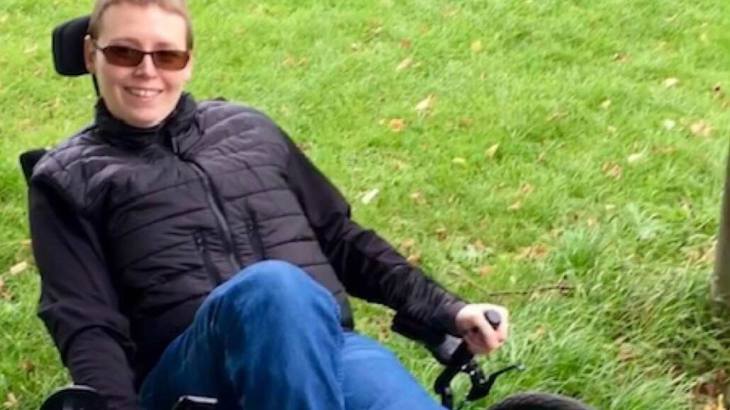Kelly Lockwood is a GP in Leeds. She uses a wheelchair and when her six-year-old daughter learnt to cycle she bought a power-assisted recumbent so the family could cycle together. Then they hit a barrier.

Kelly Lockwood: "I found it amazing to start cycling again."
Finding the right bike
I suffer from Ehlers Danlos syndrome, which means my joints are unstable and my organs and nervous system don’t work properly.
I’ve been in a wheelchair now for around ten years.
I rode a bike as a teenager but never as an adult.
Then our six-year-old daughter recently learned to ride a bike and wanted to go out.
I had a chat with my physiotherapist and she suggested trying a recumbent bike.
We tried out a few and managed to find a cheaper one on eBay.
The trike has an electric-assisted motor.
It’s two metres long and has the turning circle of a tank!
Why I love cycling
I found it amazing to start cycling again.
It’s really fun and liberating and makes you forget you’re disabled, so it’s a nice escape from my impairments.
Cycling is good for me as it maintains my muscle condition which then helps to prevent injuries.
It’s the only form of active exercise I can do outside of a pool.
It’s also a great escape from the pressures of working in the NHS at the moment and the things we’re dealing with.
I think it’s essential to maintain mental health and prevent burnout.
Cycling with family
It was wonderful to be able to cycle with my daughter and have some normal family fun during the Lockdown.
She’s inherited my condition, although not as badly, so being able to maintain muscle condition is really important for her.
We didn’t want to go on the roads as they felt too dangerous.
Our nearest traffic-free path on the National Cycle Network is the Garforth to Allerton Bywater route, which we can access from the end of our street.
It’s really pretty and you can get out to the woods and see some greenery.
The big advantage for me is that it’s flat, as large hills are a problem.
It also has a good surface, which helps a lot.
I do have suspension but on really bumpy tracks I can dislocate my shoulders.
Barriers to access
We loved our cycle ride on the Network but we hit barrier after barrier.
At the first barrier, my husband lifted the trike over and helped me stagger across.
Then we hit another one. In the end, we just gave up and went home.
It’s so important to have routes which do allow access for a wheelchair or a recumbent.
Surface is important too as a wheelchair couldn’t handle gravel, for example.
We have a really nice RSPB reserve near us which has lots of cycle paths and links with the local cycle network.
We love it round there.
But we ended up cycling round and round it because there were barriers on the edges so we couldn’t access the National Cycle Network.
The frustrating thing is that next to the barriers are gates, but they’re padlocked
It’s heartbreaking to be stopped by a physical barrier when as a disabled person, I’ve had to overcome so many in life already.
We’ve spent thousands of pounds on a bike and the National Cycle Network is tantalisingly close, but we can’t use it.





